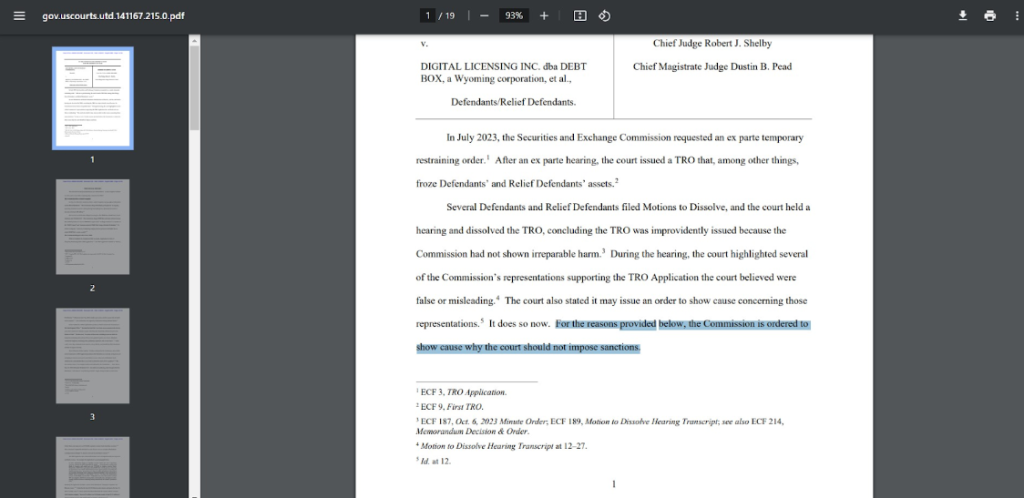In the unfolding drama at the intersection of cryptocurrency regulations and legal accountability, a US federal judge has thrown down the gauntlet, threatening the Securities and Exchange Commission (SEC) with sanctions.
The contentious battle revolves around the SEC’s move to freeze the assets of crypto firm Debt Box, a move now under intense scrutiny for allegedly relying on false evidence.

You can access the full document here.
Let’s delve into the legal labyrinth and the high-stakes clash between regulatory authority and judicial oversight.
Table of Contents,
- 1 The SEC’s Allegations: Unregistered Securities and Offshore Transfers
- 2 Debt Box’s Defense: Exposing the Fabrication
- 3 Judicial Intervention: Judge Shelby Demands Explanation
- 4 The Threat of Sanctions: Accountability on the Line
- 5 The Broader Implications: Regulatory Authority VS Judicial Scrutiny
- 6 A Pivotal Moment in Regulatory Oversight
The SEC’s Allegations: Unregistered Securities and Offshore Transfers
The saga began in July when the SEC leveled accusations against Debt Box, asserting that the crypto firm was peddling unregistered securities disguised as software licenses. The regulatory body went a step further, claiming that the management of Debt Box was orchestrating the offshore movement of the company’s assets. Armed with these allegations, the SEC sought court approval to freeze Debt Box’s bank accounts, citing the need to protect investors.
Debt Box’s Defense: Exposing the Fabrication
In a twist of events, Debt Box mounted a robust defense, presenting evidence in August that refuted the SEC’s claims. The crypto firm demonstrated that no funds had been transferred outside the United States, debunking the SEC’s narrative, and despite the lack of legal grounds for an asset freeze, the SEC proceeded with the action, prompting Judge Robert Shelby to intervene.
Judicial Intervention: Judge Shelby Demands Explanation

Not content with the SEC’s actions, Judge Shelby ordered the regulatory body to explain why it misrepresented evidence and sought a draconian decision to freeze Debt Box’s accounts. The judge’s order shines a spotlight on the critical need for transparency and accuracy in regulatory proceedings, emphasizing the potential consequences of overreach.
The Threat of Sanctions: Accountability on the Line
As the legal proceedings unfold, the SEC finds itself in the uncomfortable position of facing potential sanctions. Judge Shelby’s threat adds a layer of accountability, demanding the regulatory body justify its actions or face repercussions. The prospect of sanctions introduces a critical element of checks and balances, underscoring the importance of accountability in the regulatory landscape.
The Broader Implications: Regulatory Authority VS Judicial Scrutiny
Beyond the specific case of Debt Box, the unfolding drama encapsulates the broader tension between regulatory authority and judicial scrutiny in the cryptocurrency space. The clash raises questions about the extent to which regulatory bodies can wield power without robust checks, emphasizing the need for a balanced approach that safeguards both investor interests and the integrity of regulatory actions.
Discover related stories! Public Voices Shape the Destiny of Spot Bitcoin ETFs.
A Pivotal Moment in Regulatory Oversight
The looming threat of sanctions against the SEC in the Debt Box case marks a pivotal moment in the landscape of regulatory oversight. The outcome of this legal saga will reverberate through the cryptocurrency industry, shaping the contours of accountability and transparency in the regulatory realm.
As the judicial showdown unfolds, it poses a fundamental question: can regulatory bodies navigate the complexities of the crypto landscape while upholding the principles of fairness and accuracy? The answer may define the future trajectory of regulatory actions in the dynamic and evolving world of cryptocurrency.



